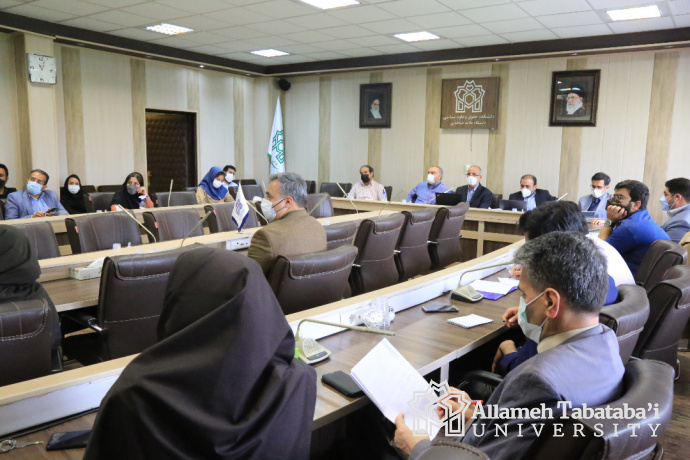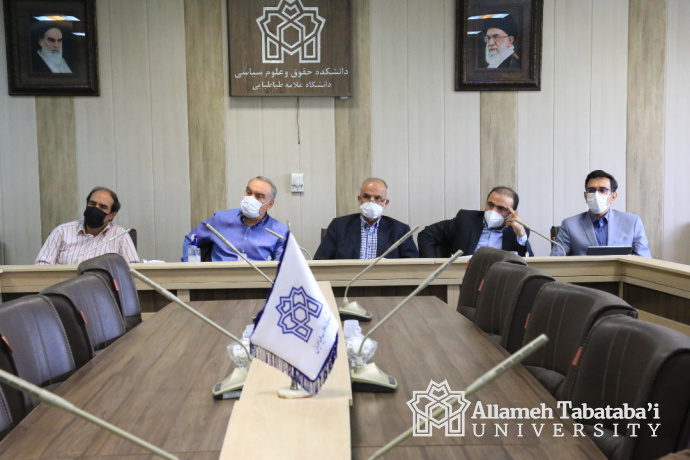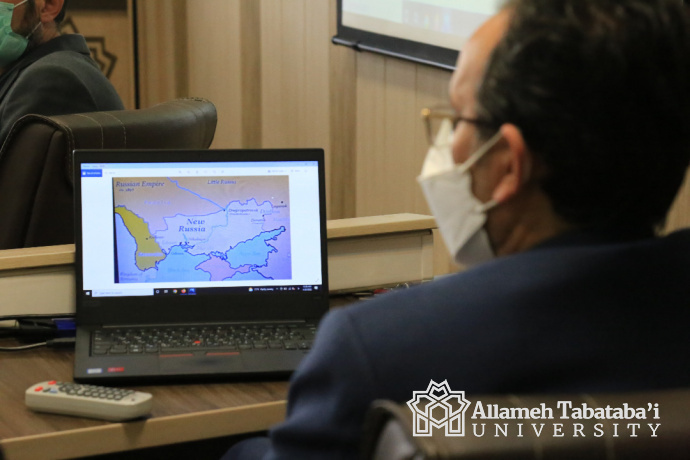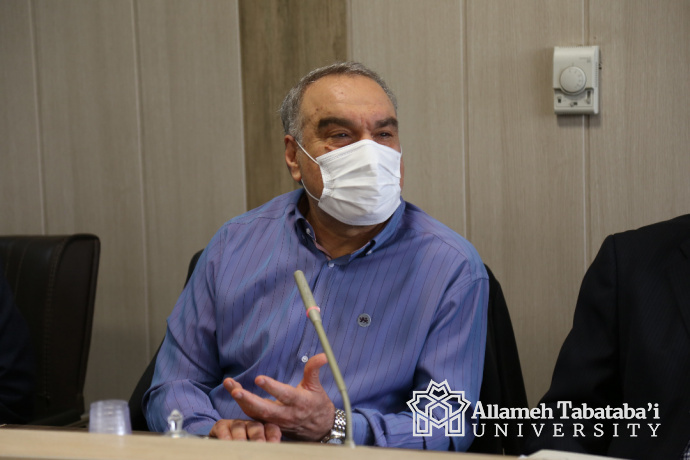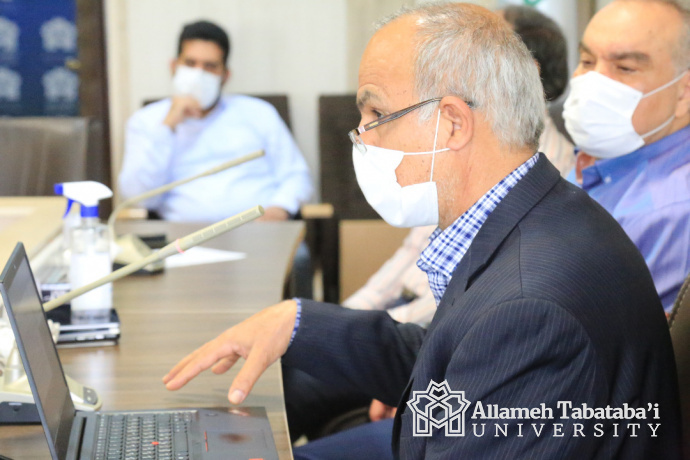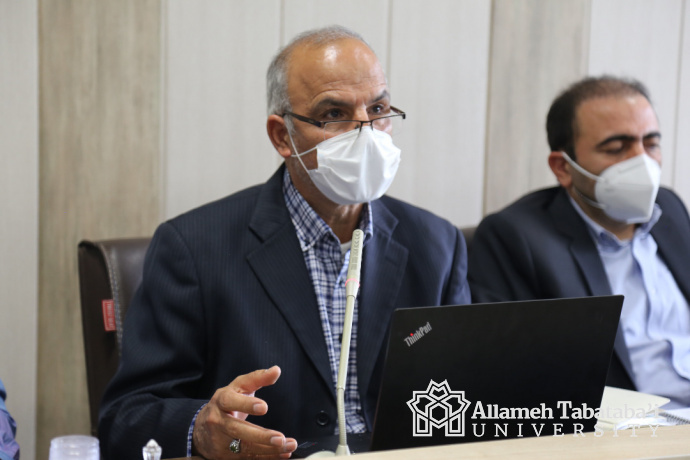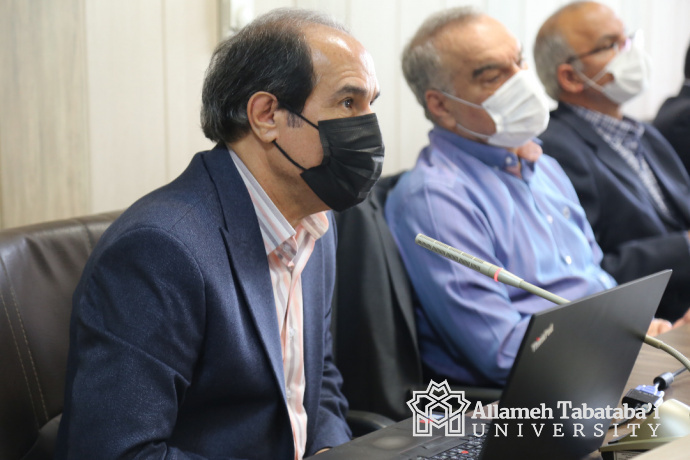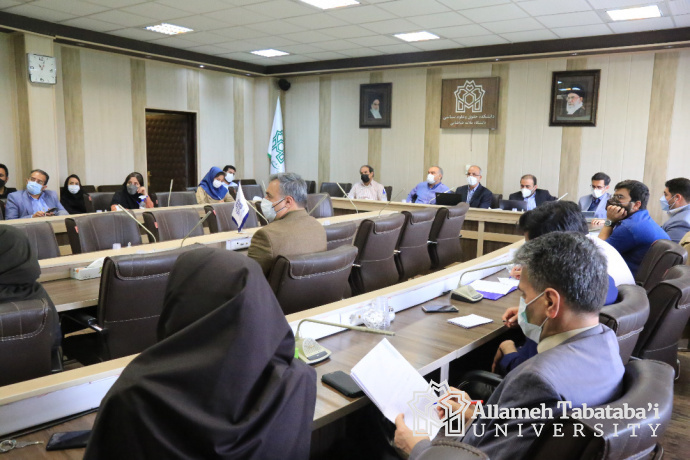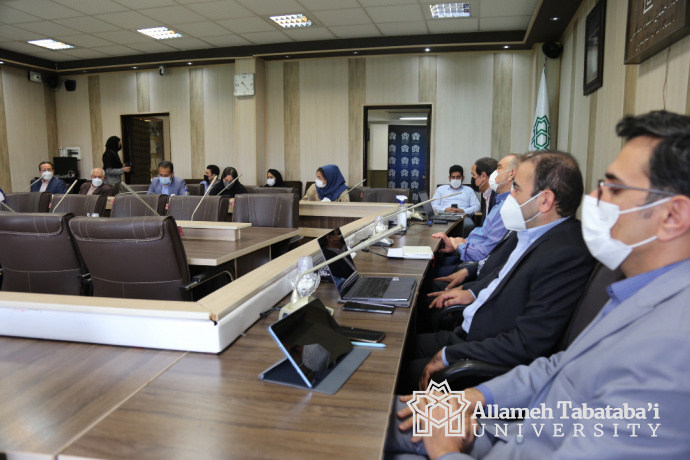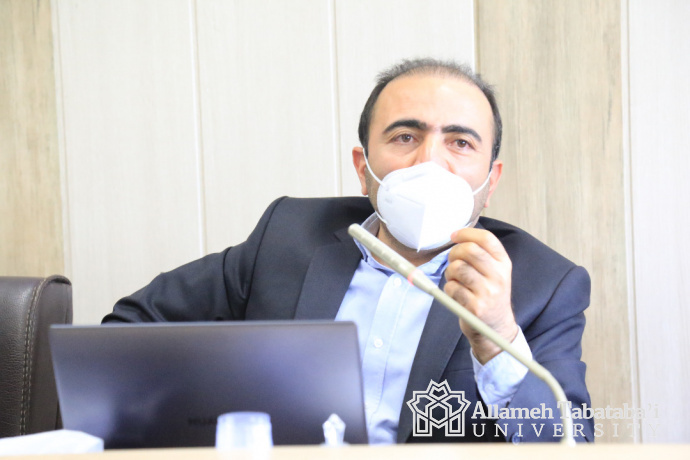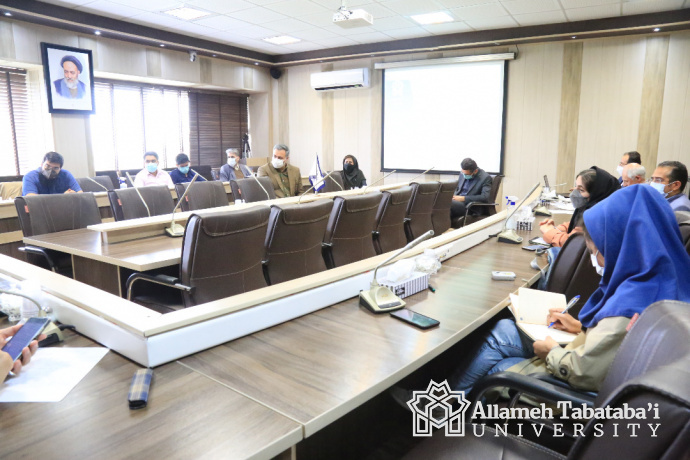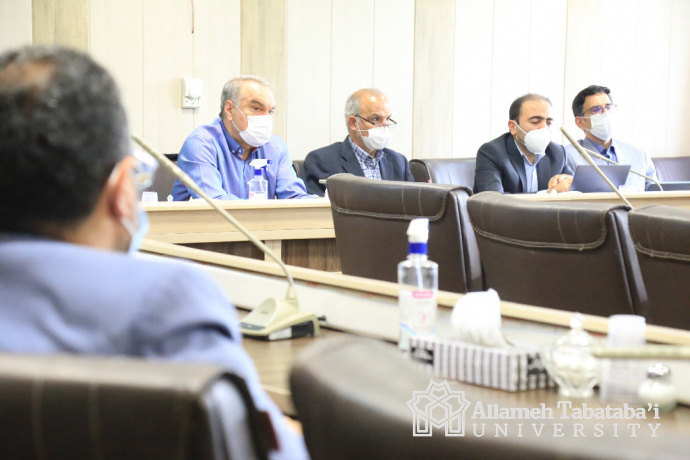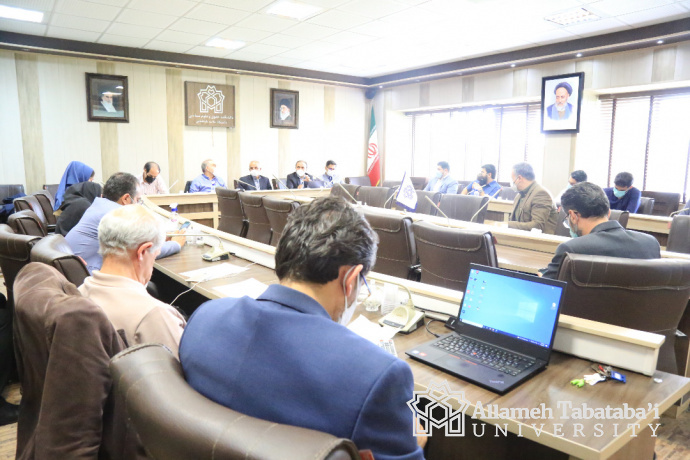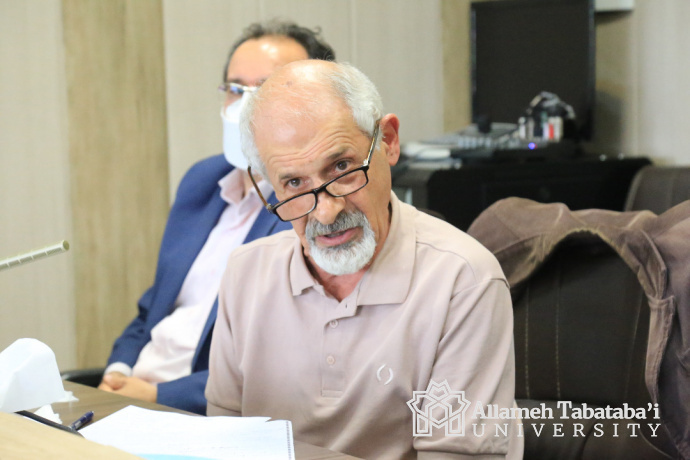Roundtable on Ukraine and Great Powers held at ATU
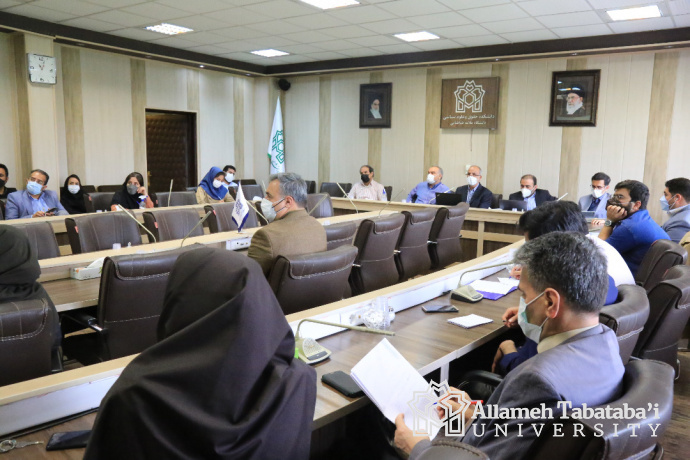
Report by the Directorate for International Academic Cooperation –
(Source: ATU's Public Relations)
On Wednesday, 20 April 2022, a specialised roundtable conference was held at the Faculty of Law and Political Sciences (LPS), and through the joint efforts made by the LPS and the Centre for Chinese Research, Allameh Tabataba'i University.
Dr Gholamreza Chegenizadeh, Head of the Centre for Chinese Research; Dr Khalil Shirgholami, Vice-President for Research's Assistant at the Institute for Political and International Studies; Dr Heidarali Masoudi, Faculty Member at Shahid Beheshti University; Dr Jahangir Karami, Faculty Member at the University of Tehran; and Dr Ali Beman Eghbali, Senior Expert in Eurasia at the Institute for Political and International Studies, Ministry of Foreign Affairs delivered speeches at this event. Faculty members and students from ATU and other universities were the other participants in the conference.
Dr Chegenizadeh said that "In the international system, no action leads to desired results without narration. If our country takes an emotional involvement in addressing strategically important issues, our national cognitive system would not be able to understand the problem. If the political system blocks the entry of important information into its cognitive system, it would actually fail. Therefore, we must consider the entry of this information as a necessary process in our country. Our media and academia have not fulfilled their national duties in this respect, hence caught in a vortex where all other people are stuck. We need to have an all-encompassing look and eliminate the existing inactivity in our scientific environments".
Pointing out that researchers and students should seriously address the crisis in Ukraine, he added that "The crisis has removed abstractness from the academic curriculum and turned it into concrete topics and courses. Accordingly, this event has an immense research appeal and plays an important role in understanding the International System and its future."
Then, Dr Jahangir Karami expanded on the Russia-Ukraine crisis from a Russian point of view, saying that "The Russian government's powerful trend, especially from the crisis in Georgia until 2016, resulted in the emergence of a new enemy for the West. Thus, the need to defeat this enemy and preserve Western identity and hegemony became a significant issue. That is why some people consider the Ukraine crisis as a US plan. It is while the Russians believe that everything is the Russian government's initiative and their own plan. However, the crisis cannot be considered to be merely a US plan or a Russian initiative; it encompasses a series of interactions where the West has played a role, but the leading role belongs to Russia.
"He then added that Russia's internal crises and the nationalists and liberalists' criticisms of Putin; Russia's economic and political problems due to sanctions; the Western-backed militarisation of Ukraine; the US-Ukraine strategic agreement; US problems in the Middle East and its withdrawal from Afghanistan; and Putin's successful experiences in the Georgia and Crimea wars have all led the Russians to conclude that it is time to enter Ukraine. Following the Russian invasion of Ukraine, the West has also started a political, economic, and media war.
Dr Karami then said that four scenarios can be anticipated for the future of this crisis: In the first scenario, if the Russians could win in the East, and their demands are met by Ukraine, they can step out of the crisis and obtain a part of their demands. In the second scenario, the Russians would win in the East, but the Ukrainians will not agree to meet their demands, and the crisis would continue. It would lead to a third scenario, i.e., a prolonged crisis without victory; due to the many damages and costs, it includes, this scenario would count as a loss for Russia. And the last scenario would be the defeat of Russia, which is not strange at all.
"If it fails, Russia will face sanctions, internal turmoil, resistance on European borders, and most importantly, the challenge of coordinating with the West. Russia has never been as strong or weak as it has seemed. For the same reason, Russia and the West have always been unclear on what to do with each other, and Russia has always been in a threshold situation and today it seems to be entering a similar threshold period. However, there are no optimistic assessments about the future of the crisis for Russia, even when Russian analysts do the assessments."
After Dr Karami, Dr Masoudi said about the US foreign policy in terms of the Ukraine crisis that "US discourses and approaches to the Ukraine issue are divided into formal and academic categories. Formal discourses include the discourse of cautious confrontation and Congress's Discourse, or the failure-oriented Russia-phobic discourse; the cautious discourse believes that Russia is seeking to revive its former empire and the US is trying to prevent it.
"The US thinks that Russia has not achieved its goals, including the display of its military power, surrender of Ukraine, and the division between Europe and the US. Another important point is that the present attack is an attack by the Russian government, and it does not necessarily have to do with Putin alone. In this discourse, the focus is on helping Ukraine to reach a stronger position in the negotiations and to accompany this country in declaring its neutrality and resuming its membership in NATO. However, the discourse has retained its confrontational aspect and provided Ukraine with a large amount of military equipment.
Regarding the failure-oriented Russia-phobic discourse, Dr Masoudi added that "This discourse is more emotional and has more followers in the US. In this discourse, an attempt is made to create an evil image of Russia and defeat it. The emotional approach to supporting Ukraine, comparing Russia to Hitler's Germany, and using economic, military, and political weapons to push back and defeat Russia in Ukraine are among the US actions in this direction".
Then Dr Masoudi talked about the academic discourse, saying that "This discourse is divided into two more specific discourses, namely the discourses of Non-alignment Realism and Belligerent Liberalism. The discourse of Non-alignment Realism means that Russia has its own security considerations, and the war has shown that the European Union's institutionalisation and interdependence cannot prevent wars. In the Discourse of Liberalism also it is believed that Ukraine is a frontline of democracy and authoritarianism, and the main cause of the war is a lack of necessary mechanisms within the Russian political system. Russia seems to be trying to move the world towards the multipolar order of which it is a part. In this crisis, China has a strategic priority for the US, and the collapse of Russian territories not only does not benefit the US, but it also creates uncertainty in the International System".
Focusing on Central and Eastern Europe, then, Dr Eghbali said: "The Ukraine crisis relates to the Black Sea and the competition that the US and Russia have started over the last 20 years. The great powers of the Black Sea include the US and the European Union, with central roles in Germany and Turkey. Russia's main goal is to change the structure of power and give a central position to Russia, and Russia's weakness in this crisis is its economy, national currency, science and technology, soft power, civil society, and weak diplomacy. Ukraine has become a reconciliation object and is the biggest loser in this scene. As the war progresses, Russia becomes more dangerous, and concerns grow about the geography and duration of the war, and the use of nuclear weapons in it."
He added that "In the current situation, Russia favours the annexation of the Eastern regions and part of the south, and the closure of Ukraine's access to the Black Sea. However, even if Russia can occupy Ukraine, it will not be worthwhile, because the West has never reached this level of unity and solidarity concerning a country's punishment. In general, the West has arrived at the conclusion about Russia that the long rule must end in this country".
Referring to the crisis from a Chinese viewpoint, Dr Shirgholami then maintained that "Americans are looking for an opportunity to disrupt the existing world order. They are also careful that the instances of territorial collapse do not create opportunities for China. China's policies are important for both sides of the crisis, but, despite its central role, China is playing marginally. China seeks partnership for global governance and creating a world based on a shared destiny for all countries, but it is stuck in a difficult situation, where on the one side there are the realities of shared human values and destiny and on the other, there is the agreement reached by Xi Jinping and Vladimir Putin on their unlimited participation".
According to him, "Chinese leaders believe that China is a world-class country and have stated that they seek to reflect Chinese values in accordance with international rules and norms. China has taken a dual approach to the crisis and has taken both a defensive and aggressive approach to the existing world order. They emphasise that the US role should be reduced in China's favour and strike a balance. However, in the current state of affairs, they are not prepared to change the world order and make a definite decision to take a special stance."
In the end of the roundtable conference, then, Deputy Vice-President for Research at the Institute for Political and International Studies, Ministry of Foreign Affairs, then maintained that "China opposes any separatist policy and attaches great importance to obtaining economic interests from Europe and the failure to form full EU-US solidarity about China. Feedback on the issues in the Ukraine crisis has led to the country's political solidarity with Russia, but they have avoided expressing their political alliance with Russia on the issue. China's internal and external challenges cannot be resolved by supporting or opposing Russia. Given that Xi Jinping needs to emerge as a successful leader in China, he is not in a position to take such a big risk. China favours a scenario in which Russia would be in crisis but not completely defeated, since, in this situation, Russia will have to side with China in several policies and respects".



